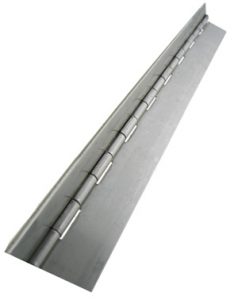
Piano hinges have become a popular alternative to traditional hinges. Like most hinges, they consist of a mechanical bearing that’s created by the junction of two leafs. Piano hinges, though, are distinguished from traditional hinges by their length. While available in different sizes, piano hinges are designed to run the entire length of the surfaces on which they are installed.
You can find piano hinges in different materials, including aluminum and steel. All piano hinges are long. After all, that’s what distinguishes them from traditional hinges. But there are nuances between aluminum and steel piano hinges.
Weight
Aluminum piano hinges weigh less than steel piano hinges. Aluminum typically weighs about 66% less than steel. As a result, aluminum piano hinges are lighter than those made of steel. The weight of a piano hinge can vary, but aluminum piano hinges almost always weigh less than steel piano hinges of the same size.
Strength
Steel piano hinges, on the other hand, are stronger than aluminum piano hinges. All types of steel are stronger, as well as more durable, than aluminum. Cold-rolled steel, though, is particularly strong and durable. Steel can be made in different ways, one of which is cold rolling. Cold-rolled steel is made by squeezing raw steel through a series of rollers. For a superior level of strength and durability, you may want to choose piano hinges made of cold-rolled steel such as this.
Support
Steel piano hinges offer greater support than aluminum piano hinges. They can withstand heavier objects, such as doors and gates, because of their high density. All piano hinges are supportive thanks to their long length. Nonetheless, steel piano hinges are more supportive than those made of aluminum.
Corrosion Resistance
Both aluminum and steel piano hinges are resistant to corrosion Aluminum is a pure metal that doesn’t contain any iron. Iron, of course, is responsible for rust. When iron oxidizes, a chemical reaction will occur that transforms it into rust. There’s no iron present in aluminum piano hinges, so they can’t rust.
Unlike aluminum, steel does contain iron. Steel is an iron alloy that contains carbon and other compounds (manganese, phosphorus, etc.). The good news is that not all types of steel are susceptible to corrosion. Stainless steel, for example, is designed specifically to withstand moisture without corroding or rusting. You can find piano hinges made of stainless steel. There are cold-rolled stainless steel piano hinges that are both strong and resistant to corrosion.
